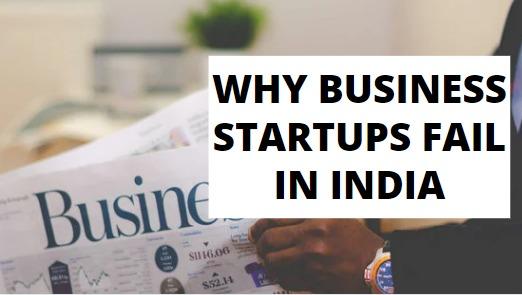Small businesses are the backbone of economies everywhere. In India, SMEs contribute to 45% of the country’s GDP. Most of these businesses are in the manufacturing and service verticals and employ over 60 million people.
Like in any other country, many Indians turn to entrepreneurship as a “quick way” to mint millions and ditch poverty for many years to come. Unfortunately, that isn’t always the case. Many Indian startups find it hard to access small business financing, lack originality, innovation, and the manpower required to convert a business idea into a success story.
As a result, they succumb to the uncertainties and pressure of building a successful enterprise and tank a few years down the line.
Top 5 reasons why small businesses fail India
Lack of small business financing
The inability to access small business loans is a bane for startups everywhere. While it’s hard to obtain financing, many Indian entrepreneurs cannot properly plan their business finances and project future capital needs. As such, they run out of cash and go belly up sooner than expected.
Yumist is a good example of an Indian startup that panned out due to a lack of financing.
Talent-opportunity gap
Human capital is the most important asset a business has. Per recent data, 73.2% of Indian adults are illiterate. Thus, skill shortage is a big problem in India. Skilled workers are snatched by big-box companies, leaving small businesses struggling to find employees with relevant skills.
Most SMEs resort to on-the-job training. Since most of them don’t have dedicated training programs, they rely on seniors to train junior workers using online courses. The net result is a lack of talented, energetic, and enthusiastic manpower required to execute a business plan and carry forward the vision and mission of a startup.
Lack of originality
The copy-cut approach is a big issue in India. Many Indian startups try to be clones of US businesses. Again, these companies try to ape marketing strategies of foreign businesses hoping that their startups will be successful like the ones they see in other countries.
According to Rishabh Lawania, founder of Xeler8, 1,503 startups have bombed in India since 2015, and the major reason is due to the replication of Western business models.
Thus, most Indian entrepreneurs fail to understand the unique needs of their customers. They use business models and marketing strategies that are a misfit in the country.
Lack of innovation
Again, lack of technical innovation is a perennial problem in India. Quoting an IBM report, news18.com reports that 90% of small businesses in India fail within the first five years due to a lack of innovation. Technology and Information Foundation (ITIF), a US-based think-tank, ranked India at the bottom of 56 innovative countries globally due to its failure to invest in education and develop human capital, while the global Innovation Index ranks India 66th.
Again, India filed only 1,423 patents between 2015 and 2016. That’s minuscule compared to Japan’s 44,235, and China’s 29,846. This has made experts argue that India has become a kind of a follower market, with the US yesterday’s innovations appearing in India tomorrow.
In fact, 77% of CVs argue that Indian startups lack unique business models and new tech innovations, according to an Entrepreneurial India study. This forces VCs to withhold capital, resulting in a lack of small business financing.
Difficult of doing business
According to livemint.com, India stands at 77th position in the ease of doing business, a 14 places jump. That is quite an improvement, but what we read on papers is different from what entrepreneurs experience on the ground.
A Lessonsatstartup.com blogger argues that red-tapism and corruption have made many businesses in India bring down the curtain due to the slow, bureaucratic processing of business files. Many are forced to give brides to hasten the process and keep the ball rolling.
The 14 place jump is meaningless to a small startup that has to bear the wrath of bad infrastructure, unexpected tax decisions, runaway corruption, and red-tapism.
Bottomline
While Indian startups struggle to access small business financing, most of them fail because of a lack of originality, innovation, and the manpower required to build a startup. Ease of doing business is also an issue, with corruption, lack of infrastructure, and slow, bureaucratic processes as the major problems.


